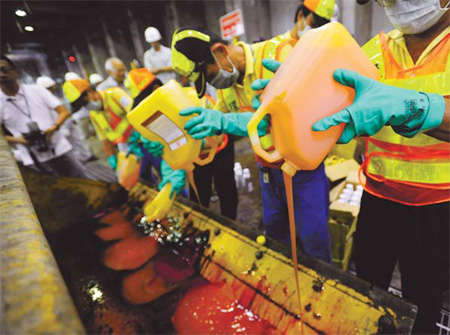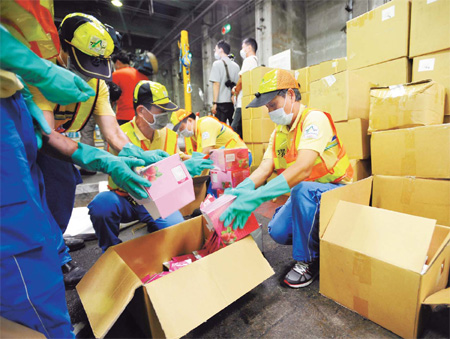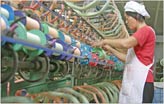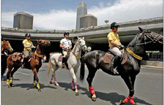Economy
Growing health concerns after latest food scare
Updated: 2011-06-13 16:37
By Wang Yan and Zheng Xin (China Daily)
|
 |
|
Food inspectors in Taipei dispose of beverages contaminated with a plasticizer at a waste treatment plant on Saturday. A total of 2.34 tons of contaminated products were destroyed at the plant that day. [Photo / Xinhua] |
Use of plasticizer in some products sparks widespread fears, report Wang Yan and Zheng Xin in Beijing.
Would you care for bubble tea or a sports drink? Some papaya jam? These days, the answer is likely: No, thank you. No way.
Tempting as they appear, those foods might contain DEHP, an organic compound usually used to make plastic soft and pliable. Taiwan's health authorities announced the use of DEHP in some products on May 23 and demanded that 168 food processors recall more than 1 million tainted items.
On the Chinese mainland, the State Food and Drug Administration announced on Saturday that eight products, food flavors, butter substitute and baked goods, made in Guangdong and Zhejiang provinces were found to contain DEHP.
The plasticizer was illegally added to food and drinks as a substitute for a traditional and more expensive emulsifier, such as palm oil. For 100-yuan ($15) worth of palm oil, the same amount of DEHP costs only about 20 yuan, said Li Shuguang, a food science professor at Fudan University, during an interview with CCTV.
Consumers may not be familiar with DEHP by either of its chemical names, bis(2-ethylhexyl)phthalate or di(2-ethylhexyl)phthalate, but they have quickly recognized its initials.
Few people knew about melamine, either, until it was discovered in 2008 to have been added to dairy products, including milk powder for babies. At least six infants died and almost 300,000 people were sickened in China.
According to Li's research, DEHP in food and drinks can cause cancer. It also can lead to kidney or testicular damage and fertility problems if it is consumed regularly and accumulates in the body. Children are the most vulnerable group, his research shows.
Governments on mainland and elsewhere have responded.
In Taiwan, 286 tons of tainted food products were either incinerated at 850 degrees or poured into sewage treatment works on Saturday. On China's mainland by Friday, the food safety watchdog had suspended imports of 950 kinds of products made by 280 companies in Taiwan.
However, Chen Junshi, director of the Fortified Food Office under the Chinese Center for Disease Control and Prevention, asked consumers to calm down and not be frightened by the figures. "The listed products only account for a small portion of all the products in the market. There are far more we can eat."
Chen also said only one company has been identified as producing the DEHP-tainted emulsifier and selling it to food and beverage manufacturers. He said there was no evidence the "downstream manufacturers" were aware of the illegal additive.
The Taiwan government identified the company as Yushen Food Co Ltd, the biggest emulsifier supplier in Taiwan. It has a relationship with Yuyan Food Co Ltd, in Dongguan, Guangdong province, although the exact nature of the connection couldn't be determined.
On June 1, police in Guangdong arrested the owner of Yuyan Food and confiscated 6 tons of food additives and 0.6 ton of raw materials. The initial probe showed that raw materials Yuyan Food imported from Yushen Food might have been contaminated by DEHP.
Yuyan Food started operations in April 2009 and produced about 3,000 kilograms of food additives every month, on average. The products were mostly sold in the province, food safety officials said.
The latest test results show that eight of the 6,100 samples tested in 28 provinces in China were found to contain DEHP. The products came from four manufacturers from Guangdong and Zhejiang.
1,000-plus additives
The guarantee of food safety lies in production rather than supervision, said Chen from the CDC's Fortified Food Office.
"The allowed food additives in the country total more than 1,000 items, which can be tested, but many companies do not announce what they add to their products," as required, Chen said. "It's impossible for the supervisory department to conduct a thorough inspection of all the hundreds of thousands of chemical components. It's impractical because all the cost would finally go to the consumers in the end."
It is unlikely that DEHP has been added to many foods and drinks on China's mainland, but only "because mainland enterprises have not mastered the technique yet," said Dong Jinshi, executive vice-president of the International Food Packaging Association.
 |
|
Employees of Taiwan food safety authorities destroy DEHP-tainted products on Saturday. In Taiwan, 286 tons of tainted food products were either incinerated or poured into sewage treatment works. [Photo / Xinhua] |
Still, he expressed concern over the abuse of plasticizers. For example, he said, polyvinyl chloride (PVC) wrappers might leach out the DEHP they contain when they are used to wrap high-fat foods or food that is being heated.
And there is always a risk when materials are added illegally, he said. "When making plastic containers, some manufacturers might add in poisonous chemicals or add in an overdose amount to make their products softer and brighter."
About 20 kinds of plasticizers have been widely used in commodities such as packing materials, plastic containers for cooking oil and toys, he said.
Tests in Hong Kong
In Hong Kong, the Center for Food Safety and the Department of Health have stepped up quality inspections of imported food from Taiwan, including beverage, tea, jam, capsules, powder, calcium tablets, fruit syrup and juice.
The Hong Kong Special Administrative Region government has formed a special team and put it in charge of Taiwan-imported food inspection.
The Center for Food Safety released the results of its first DEHP test on May 30, showing two of the nine tested beverages imported from Taiwan contained DEHP, 1 to 17 times more than the safety standard. The next day, Hong Kong banned imports of the two drinks, Dongneng Sports Drinks and Dongneng Sports Drinks Lemon Flavor.
On Tuesday, the center added 23 kinds of fruit syrup and juice to its blacklist after Taiwan notified it that the products had been distributed to Hong Kong.
More than 500 shops and restaurants sell Taiwanese bubble tea, according to the Hong Kong Food Council, but now many residents are opting instead for tea or fruit juice.
"I dare not drink the Taiwanese bubble tea any more," Christy Lau, 29, told China Daily.
A study last year by the biology department at Hong Kong Baptist University found the presence of DEHP in blood samples of more than 90 percent of 200 local residents. "However, the result is not too serious," Huang Gangzhu, a biology professor, said in an interview with Sing Tao Daily. "Related indicators of the blood samples are comparatively low."
Huang said the tests show that DEHP has been in food for a long time. "This kind of chemical is easily absorbed yet hard to discover."
Each year, Hong Kong tests 60,000 to 70,000 samples of food and beverages, according to its Food and Health Bureau. On June 3, the Center for Food Safety added DEHP to its list of items it tests for, and suggested an allowable limit of 1.5 milligrams a kilogram. Any item exceeding the standard should be reclaimed and destroyed, the center said.
 |
|
Chen Che-hsiung and his wife are in custody after they admitted illegally using another plasticizer, DINP, at their Taiwan company, Pin Han Perfumery, on May 28. [Photo / Xinhua] |
Vigilance elsewhere
In Vietnam, the Food Sanitary Safety Administration, under the Vietnamese Ministry of Health, has been cooperating with Taiwan to test samples of goods in the market and to determine which companies would likely trade DEHP-tainted products.
Special teams have been established nationwide to inspect companies importing, producing and distributing products that might contain DEHP.
Vietnamese officials raided a company that imported Taiwanese food items contaminated with DEHP on June 2, according to VOH, the official radio of Ho Chi Minh City.
The company, New Choice Foods Co., was an overseas distributor of jellies and other foods produced by Taiwan's Triko Foods Co Ltd, which was found to have used DEHP in its products.
The food safety administration will expand its inspection of products that have used chemical substances from Taiwan, the Ministry of Health said.
In the Philippines, the Food and Drug Administration has been checking whether some Taiwanese products that might contain DEHP have been imported.
In addition, a team named AlerToxic Patrollers has been working in Manila's Chinatown since May 31, urging shop owners to stop selling Taiwanese products that have not been declared safe.
| ||||
In the United States, some Taiwanese beverage chain stores in California immediately stopped selling items considered likely to be contaminated with DEHP.
Dahua Supermarket, a Taiwan-based Chinese supermarket chain, said it thoroughly inspected all its food and beverages from Taiwan and allowed customers to return the items.
"We have only found two DEHP-tainted beverages so far, and they are not hot products at all," Cao Qizheng, the spokeswoman in Southern California, told CCTV. "The United States is very strict about imports, and most of the products listed could not be found here in the States."
Specials

Wealth of difference
Rich coastal areas offer contrasting ways of dealing with country's development

Seal of approval
The dying tradition of seal engraving has now become a UNIVERSITY major

Making perfect horse sense
Riding horses to work may be the clean, green answer to frustrated car owners in traffic-trapped cities

